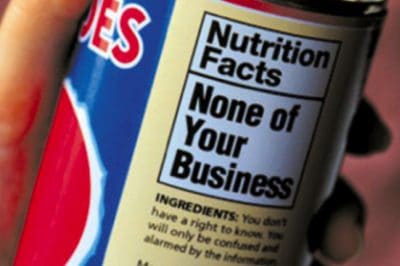
The original DARK Act (Denying Americans the Right to Know) was passed last year in the House and attempted to keep states from passing laws that required GMO labeling, blocking the FDA from ever creating mandatory labeling laws.
Fortunately, the DARK Act didn’t pass in the Senate; unfortunately, that’s not the last we’ve heard from food companies and corrupt policy makers about GMO labeling laws. Earlier this month, the Senate passed a similar bill with essentially the same results.
Initially, the DARK Act was in response to Vermont creating strict laws that require clear labels for foods produced, even partially, with genetically-modified organisms. The law passed in 2014 and went into effect at the beginning of this month.
Since Vermont’s law is everlasting and might encourage other states to follow suit, food companies remained threatened, prompting them to speak with the Agriculture Committee Chair Pat Roberts and Ranking Member Debbie Stabenow to develop a federal “compromise.” That compromise resulted in essentially the same bill because the packages would still not contain on-package information about whether the product contains GMOs.
Instead, that information will be available by either scanning a QR code on the back of the packaging, calling a 1-800 number to inquire about the contents, or visiting a website listed on the package to determine if it contains GMOs. This is a huge inconvenience for every consumer since it requires the shopper to have a cell phone and cell signal to call, or internet access to look it up online. Not to mention the fact that many are not willing to look up every single item they are thinking of purchasing, and many people do not have cell phones.

Additionally, the bill would create a national standard for labeling that the Agriculture Secretary would have two years to develop. The national standard would completely eliminate individual state standards and block states from passing legislation regarding labeling. This means that Vermont’s recent law would be null.
The labeling scheme would also be practically voluntary on the part of food companies because there are no penalties for not following the scheme, unlike Vermont’s current law that charges $1,000/day per product.
The Secretary of Agriculture will be in charge of creating the standard, and the pressure from agribusiness and biotech companies could mean that entire classifications of processed foods could be exempt from being listed on the QR codes.
Not surprisingly, the two lawmakers that developed the compromise, Roberts and Stabenow, were each paid heavily by agribusiness to push a pro-GMO agenda; more specifically, they were each paid $2,808,111 and $1,565,978, respectively.
This bill will need to be introduced in the House and passed before it can be presented to the President for approval, so there is still some hope that it won’t pass. Talk to your representative today to express your opposition of this bill.
What are your thoughts on this new DARK Act? Please share, like, and comment on this article!
This article (Americans, Prepare To Be In The DARK Again About What’s In Your Food) is free and open source. You have permission to republish this article under a Creative Commons license with attribution to the author and TrueActivist.com


